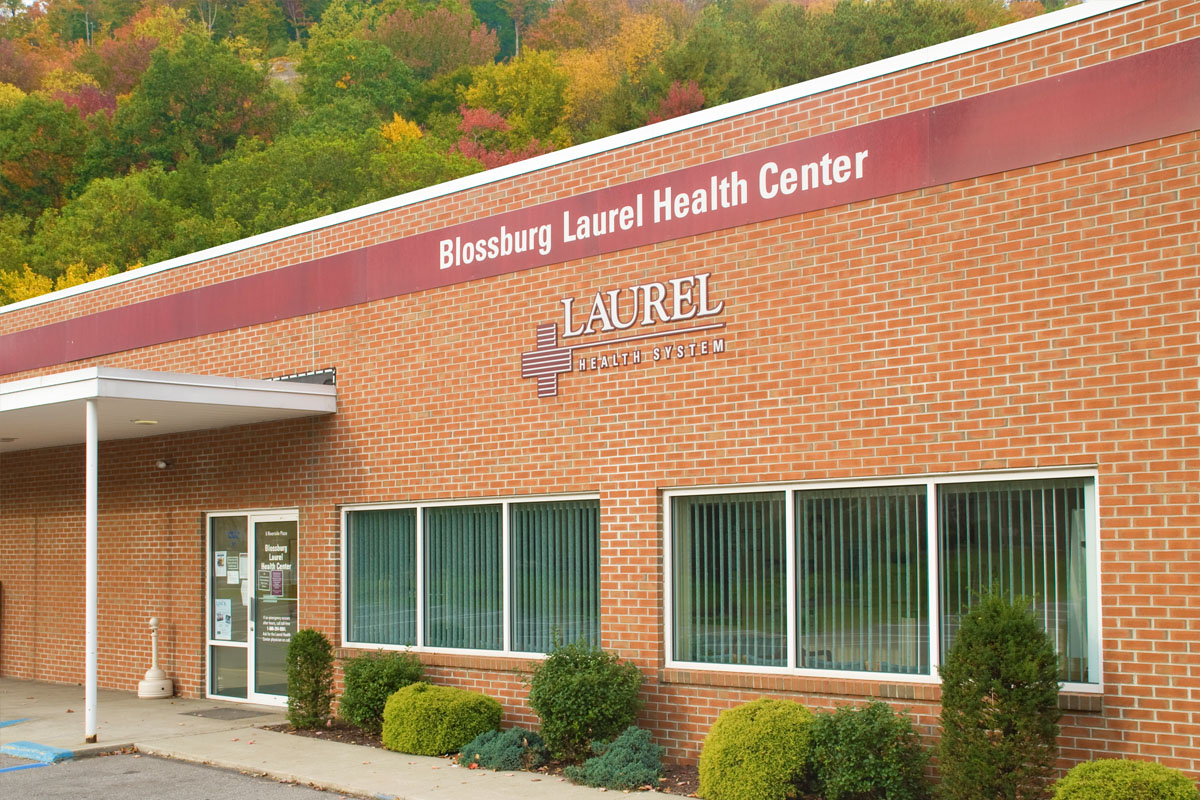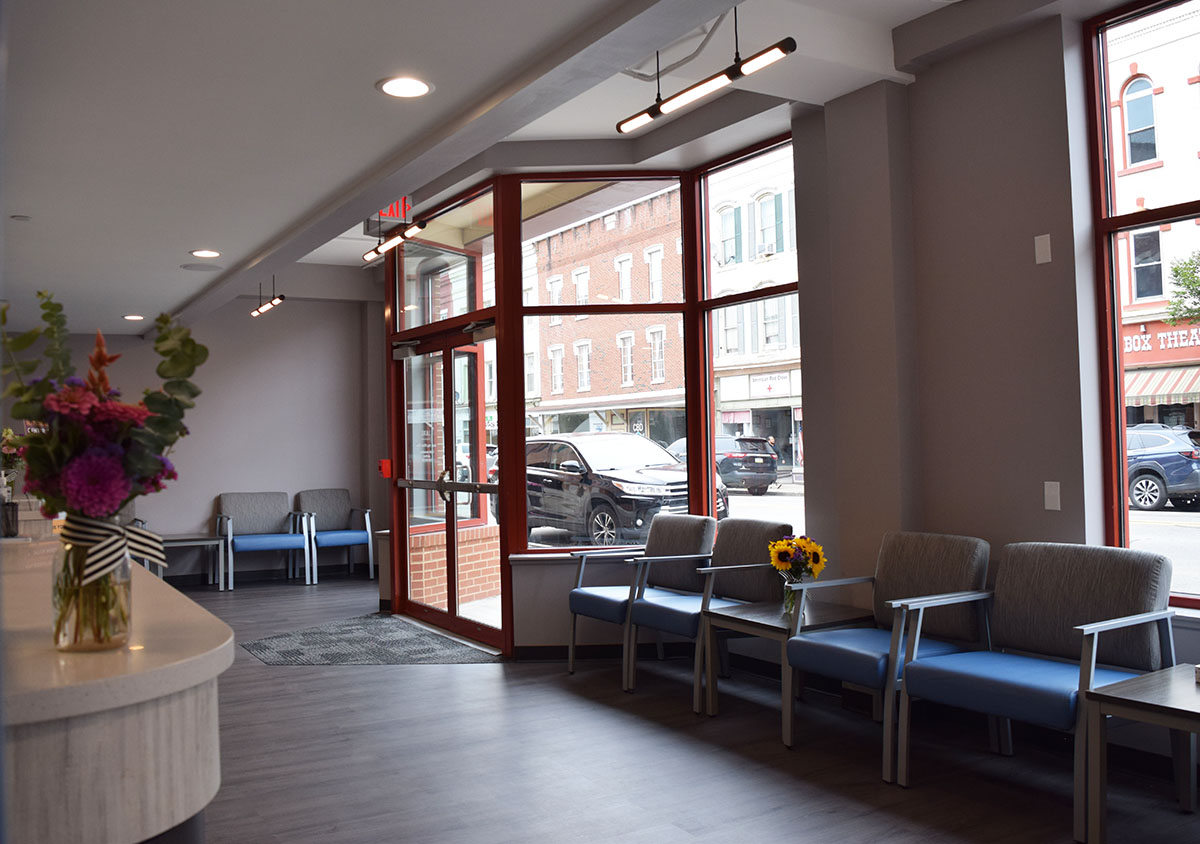Women's Health Services
Laurel Health empowers women to take control of their well-being with compassionate care for women of all ages. We are proud to be a trusted healthcare provider for comprehensive women's health services in northcentral Pennsylvania.
Receive Quality Women's Health Services From Laurel Health
Take control of your wellness with high-quality women's healthcare. Our dedicated women's health professionals provide family medicine, wellness, and gynecology services you can count on. We offer quick and convenient women's health screenings at locations throughout Bradford, Tioga, and Sullivan Counties in northcentral Pennsylvania, including Blossburg, Elkland, Laporte, Lawrenceville, Mansfield, Towanda, Troy, Wellsboro, and Westfield, PA. Call 1-833-LAURELHC (1-833-528-7354) to book your women's health appointment at one of our Laurel Health Centers today.
Jump To:
Our Women's Health Services
Women's healthcare is vital to ensure you receive the proper care to protect your health, now and in the future. Age-based women's health services can help you and your provider better monitor your health, identify your personal risks, and catch potential trouble early when it’s easier to treat.
Early detection leads to better health outcomes, and preventive screenings can help you prevent a serious health problem from developing at all. For example, annual blood work can spot a low vitamin D value before it becomes a serious deficiency that affects your health, and cervical cancer screenings are designed to detect anomalies so that pre-cancerous cells can be addressed before they have the chance to develop into cancer.
Our compassionate and professional healthcare providers offer a wide variety of women's wellness and reproductive health services to keep you healthy at every age. A women's health exam provides the perfect opportunity to discuss a variety of women's health issues and screenings, including:
- Birth control and the different types of contraception available
- Menstrual issues
- Peri-menopause and menopause
- Family planning and post-natal care for new mothers
- Incontinence
- Preventive screenings (when to begin and how often to get them)
- Testing and treatment for sexually transmitted infections & venereal diseases (STDs, STIs, and VD)
Is cost a barrier to your care? Laurel Health ensures every woman has access to comprehensive care; we offer a sliding fee program to help income-eligible women with healthcare costs and can help you apply for additional financial assistance. Our certified application counselors are ready to help you apply for our program today.
For more information about our sliding fee program, simply call our friendly staff at 1-877-723-0589. If you are uninsured or underinsured, we provide free counseling to help you compare insurance plans, review your financial aid options, and enroll in healthcare coverage. To speak with our insurance counselors, call 570-723-3424.
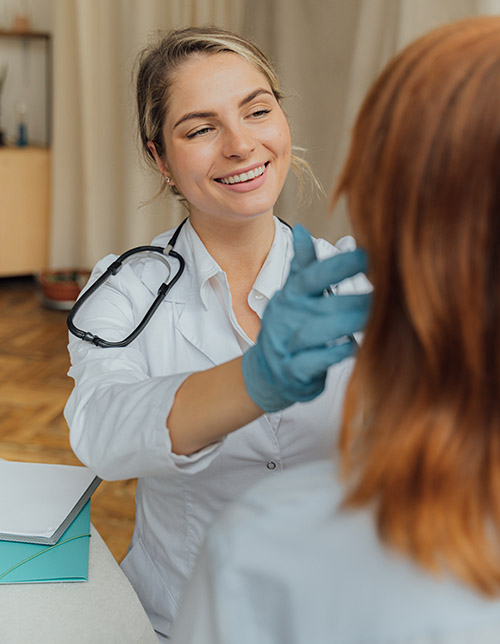
Well-Woman Exams
Maintain your health with regular examinations that screen against cancer and other potential reproductive health issues. Your well-woman exam may include the following preventive screenings:
- Breast exam
- Pelvic exam
- Cervical cancer screening (pap test)
- Blood work
Getting an annual well-woman exam helps you stay healthier by keeping up with recommended preventive care and regularly updating your provider about your health. Laurel Health believes in personalized care. Your age, genetics, and family health history determine when you should start receiving each type of preventive screening exam.
Our kind and knowledgeable staff will discuss what tests are most appropriate for your unique health needs and when to begin them. We'll thoroughly explain exam procedures beforehand and guide you through the test results so that you can feel confident and comfortable every step of the way. It is also our policy to have an additional staff member present with you and your doctor during sensitive exams to provide you comfort and support; you are also welcome to bring your own support person to your exam.
When To Begin Women's Health Exams
Laurel Health is committed to helping women lead healthier lives at every age. A key part of wellness is preventive care, and it's never too late to start! Women's health screenings help your provider better monitor your health and intervene early to prevent serious health problems from developing. Your health needs can also change as you age. Check out your age bracket below to learn more about what wellness screenings are recommended for your age group.
In Your 20s: You should begin physical breast exams, pelvic exams, and cervical cancer screenings in your 20s. Most women should receive their first pap at age 21 then get screened every 3 years until age 30. This exam may also include a pelvic exam, which involves your provider palpating your abdomen with their hands to check the size, shape, and position of your uterus and ovaries. If you have not been vaccinated against HPV as part of your childhood immunizations, schedule an HPV vaccine now.
Cervical cancer is almost always caused by the human papillomavirus (HPV), and some HPV strains are more likely to cause cancer than others. The HPV vaccine is designed to help your body identify and better fight off the most high-risk HPV strains to lower your risk of developing cancer.
In Your 30s: Women in their 30s should have a cervical screening (also known as a pap test or pap smear) every 3-5 years based on whether they are considered at increased risk or have a history of normal pap tests. Your doctor may recommend blood work. Your yearly physical will likely include breast exams and pelvic exams that palpate your breasts and abdomen to check for lumps, cysts, or any changes to the tissue. If you or your provider notice a change, they may recommend follow-up imaging like an ultrasound for further review.
In Your 40s: In addition to continuing breast exams by your doctor, it is recommended that you begin mammograms when you reach your 40s. Mammograms compress and x-ray the breasts to detect any potential cancerous tissue. They can also identify benign masses like cysts and fibroadenomas. Most women of average breast cancer risk should receive their first mammogram between the ages 40 and 45. 3D mammography may be recommended if you have dense breast tissue.
Everyone aged 40 and up should have their blood pressure checked at least once a year (e.g., as part of their yearly wellness physical). If you are at risk for heart disease, have elevated readings, or are on blood pressure medication, your doctor will recommend BP screenings more often.
In Your 50s: Women in their fifties should continue to receive cervical screenings and mammograms. Your healthcare provider will advise how often you should have a pap test and if you should receive mammograms annually or once every two years based on your health and history. Your provider will likely recommend blood work to review and monitor changes in your cholestrol, blood sugar, and bodily function (e.g., kidney function).
In Your 60s and Up: Women over 65 should be screened for osteoporosis (bone loss) with a bone density test. Bone density tests help your provider evaluate if you are at high risk for a fracture. Women are at greater risk for developing osteopenia (low bone density) and osteoporosis (bone loss) because women's bones are typically smaller and less dense than men's bones. During menopause, estrogen levels fall, which also affects bone production. Your provider will also likely order blood work to monitor your values, including your Vitamin D levels.
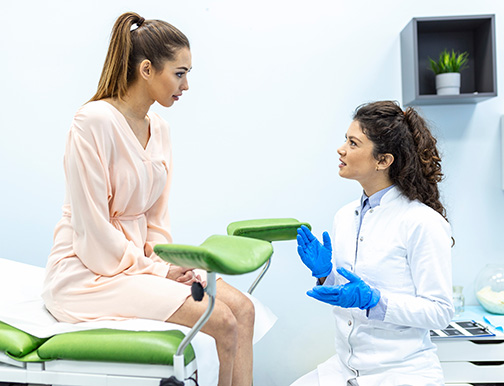 Cervical Cancer Screenings
Cervical Cancer Screenings
Cervical cancer is one of the leading cancers impacting women’s health, but it is highly treatable when detected early and can often be prevented by acting quickly on pre-cancerous cells. A cervical cancer screening, also known as a pap smear or pap test, is aimed at identifying pre-cancerous cells before you’re experiencing any symptoms and treating them to stop cervical cancer from developing.
This screening can provide life-saving care, but due to anxiety, discomfort, or embarrassment about this exam, some patients skip or delay this important screening. Don't put off your exam and allow trouble more time to brew. Pap tests are covered at no cost by most insurances. If you don’t have insurance, Laurel Health's care coordinators can help connect you with programs that provide access to free or low-cost cervical screenings.
Most women should begin their cervical screenings as follows:
- Start screening at age 21. You should schedule your first pap test at age 21 regardless of whether or not you’re sexually active because it helps establish a healthy baseline.
- For those aged 21 – 29, pap tests are recommended every 3 years.
- For those aged 30 – 65 at average risk, pap tests are recommended every 5 years.
- Those over age 65 should be screened based on their cervical health history and personal risk. If you are over 65 and considered low risk for developing cervical cancer with a steady history of normal cervical screenings, your provider may discontinue testing.
Your healthcare provider may recommend more frequent testing if you have an abnormal test result, a weakened immune system, certain health conditions, a family history of cervical cancer, or previously had pre-cancerous cells or cervical cancer.
 Postnatal and Postpartum Care
Postnatal and Postpartum Care
Make Laurel Health part of your support system after giving birth. You can count on our caring team to help you adjust to the physical and mental changes you're experiencing after childbirth without pressure or judgment. Our providers specialize in providing both comprehensive postnatal care and dedicated pediatric care to assure your needs and your little one's needs are met. While this is a special time, we know it can also be a very challenging time. Laurel Health can help you better adapt to your new routine as you recover from your delivery.
We are here to help you with:
- Your well-being (physical and emotional health)
- Your recovery after giving birth
- Your baby's sleeping schedule
- How you're adjusting to life with the new baby
- Baby care and feeding
- Any health concerns or complications while healing
 Menopause Support
Menopause Support
Menopause marks the end of monthly menstruation (periods) and occurs when ovaries have completely stopped producing hormones and eggs. You have officially reached menopause when you go 12 consecutive months without having a period. Most women reach menopause between age 40 and 60 with the average age being 51, but every person is unique. Your family history and genetics will likely play a role in when you reach menopause.
Before periods stop altogether, women begin to experience changes in their menstrual cycle as their bodies naturally begin to decrease the production of eggs and related hormones. The transition into menopause can last 2–10 years. This transitional time is called perimenopause, and it can cause a host of symptoms:
- Changes in monthly cycle lengths, including irregular or skipped periods
- Hot flashes
- Mood changes
- Night sweats
- Trouble sleeping
- Bodily changes like vaginal dryness
- Decreases in natural hormone levels, including estrogen and progesterone
You do not have to simply “put up with” perimenopause or menopause symptoms. There are more approaches than ever to effectively tackle this transition. Our women's health experts work with you to develop a plan that safely and comfortably manages your symptoms. Together, we can make a plan that addresses and alleviates your symptoms to make this transition easier.
Schedule an Appointment at One of Our Locations
Access to women's health services is crucial to ensuring you receive the specialized medical care you need. The Laurel Health Centers provide women's health services throughout Tioga and Bradford Counties, PA, to ensure you have care you can count on. For more information about our services or to schedule a women's health appointment, contact us today.
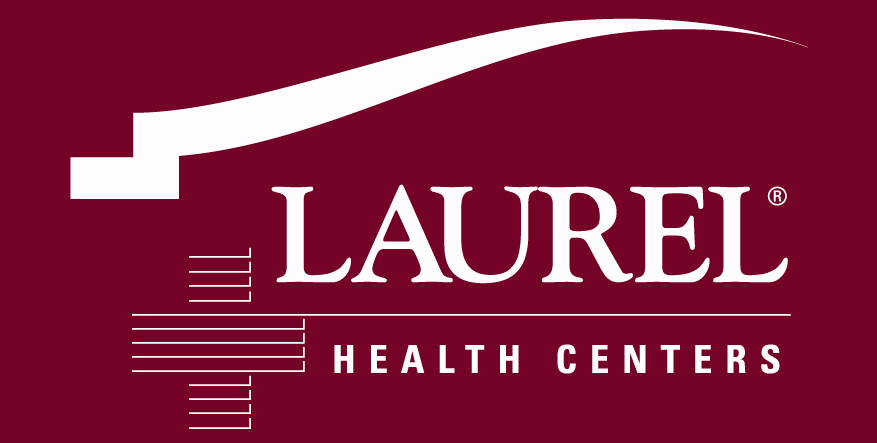
Blossburg
![]() Blossburg LHC
Blossburg LHC
6 Riverside Plaza, Blossburg
Laurel Dental - Blossburg
116 Seymour Street, Blossburg
![]() Family Medicine (6 Riverside)
Family Medicine (6 Riverside)
Mon, Tu, Th, Fri 7:00 am - 5:00 pm
Wednesdays 8:00 am - 4:30 pm
Dental Services (116 Seymour St)
Mon - Thu 7:30 am - 4:30 pm
Fridays 7:30 am - 1:30 pm
![]() 570-638-2174 (LHC)
570-638-2174 (LHC)
570-638-3468 (Dental)
Lawrenceville
![]() Lawrenceville LHC
Lawrenceville LHC
32 East Lawrence Rd., Lawrenceville
![]() Family Medicine:
Family Medicine:
Mon & Fri 8:00 am - 5:00 pm
Tues - Thurs 7:00 am - 5:00 pm
Dental Services:
Mon - Fri 8:00 am - 4:30 pm
![]() 570-827-0125 (LHC)
570-827-0125 (LHC)
570-827-0145 (Dental)
Wellsboro
![]() Wellsboro LHC
Wellsboro LHC
7 Water Street, Wellsboro
![]() Family Medicine:
Family Medicine:
Mon - Fri 8:00 am - 5:00 pm
Chiropractic Services:
Mon - Thurs 8:00 am - 5:00 pm
Walk-in Care:
Mon - Fri 8:00 am - 4:30 pm
![]() 570-724-1010
570-724-1010
Elkland
![]() Elkland LHC
Elkland LHC
103 Forestview Drive, Elkland
![]() Family Medicine:
Family Medicine:
Mon - Fri 8:00 am - 5:00 pm
Chiropractic Services:
Thursdays 8:00 am - 2:30 pm
![]() 814-258-5117
814-258-5117
Mansfield
![]() Mansfield LHC
Mansfield LHC
416 South Main Street, Mansfield
![]() Family Medicine:
Family Medicine:
Mon - Fri 7:00 am - 5:00 pm
Walk-in Care:
Mon - Fri 7:30 am - 5:00 pm
Saturdays 8:00 am - 1:00 pm
![]() 570-662-2002
570-662-2002
Westfield
![]() Westfield LHC
Westfield LHC
236 East Main Street, Westfield
![]() Mon, Tue, Thu, Fri 8:30 am - 5:00 pm
Mon, Tue, Thu, Fri 8:30 am - 5:00 pm
![]() 814-367-5911
814-367-5911
Troy
![]() Troy LHC
Troy LHC
45 Mud Creek Road, Troy
![]() Family Medicine:
Family Medicine:
Mon - Thurs 7:00 am - 5:00 pm
Fridays 8:00 am - 5:00 pm
Chiropractic Care:
Mon - Thurs 7:00 am - 4:30 pm
Dental Services:
Mon - Fri 8:00 am - 4:30 pm
Walk-in Care:
Mon - Fri 8:00 am - 12:00 pm
![]() 570-297-3746
570-297-3746
LBH
![]() Laurel Behavioral Health
Laurel Behavioral Health
Laurel Health & Wellness Center
40 West Wellsboro Street, Mansfield
![]() Behavioral Health:
Behavioral Health:
Mon & Thurs 8:00 am - 5:00 pm
Tues & Wed 8:00 am - 8:00 pm
Fridays 8:00 am - 4:30 pm
LHC Administration:
Mon - Fri 7:30 am - 3:30 pm
![]() 570-723-0620 (LBH)
570-723-0620 (LBH)
570-662-1945 (Admin)
Towanda
![]() Towanda LHC
Towanda LHC
410 Main St., Suite 102, Towanda
Laurel Dental Towanda (York)
346 York Avenue, Towanda
Laurel Dental Towanda (Plaza)
1 Elizabeth St., Suite 6, Towanda
![]() Family Medicine (Main St.)
Family Medicine (Main St.)
Mon - Fri 8:00 am - 5:00 pm
Dental (York Ave):
Mon - Thurs 7:30 am - 4:30 pm
Fridays 7:30 am - 2:30 pm
Dental (Progress Plaza):
Mon - Thurs 8:00 am - 5:00 pm
![]() 570-266-5882 (LHC, Main St.)
570-266-5882 (LHC, Main St.)
570-828-3992 (Dental, York)
570-265-2069 (Dental, Plaza)
Laporte
![]() Sullivan County LHC
Sullivan County LHC
217 King St., Laporte, PA
![]() Family Medicine:
Family Medicine:
Mon, Tue, Thu, Fri 8:00 am - 4:30 pm
Dental Services:
Mon - Thurs 8:30 am - 3:00 pm
![]() 1-833-528-7354 (LHC & Dental)
1-833-528-7354 (LHC & Dental)
570-946-5101 (LHC)
570-946-4363 (Dental)
